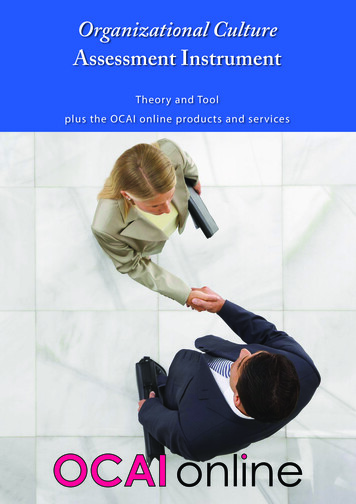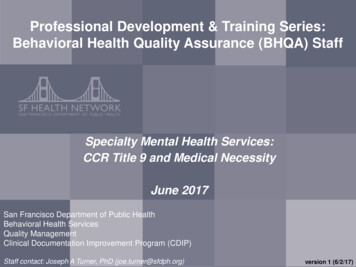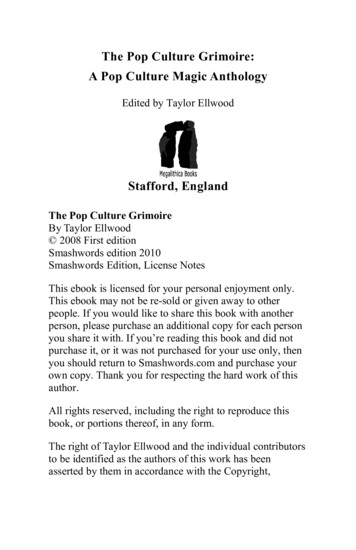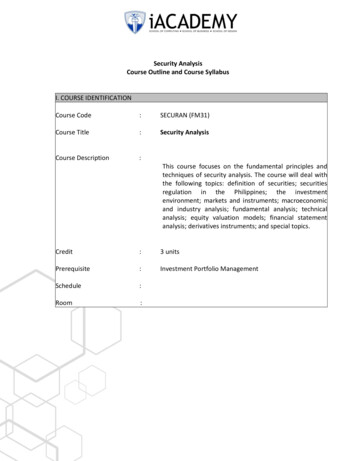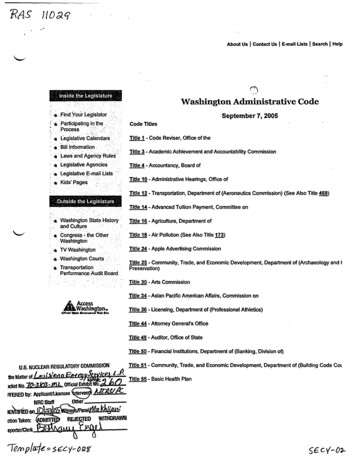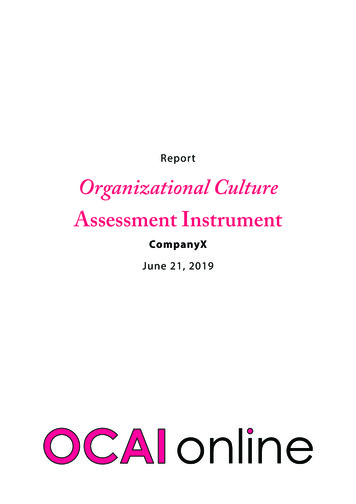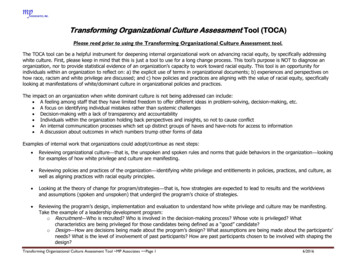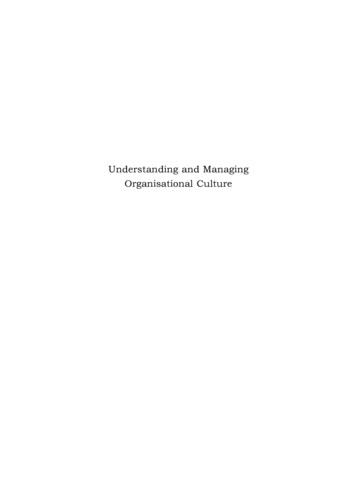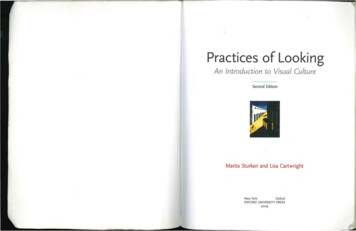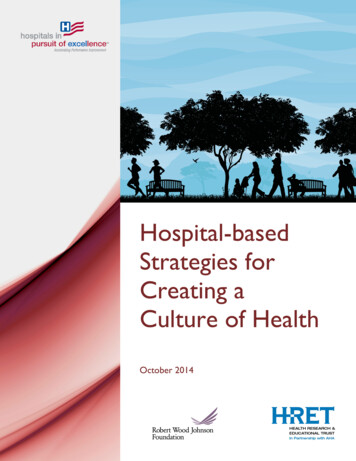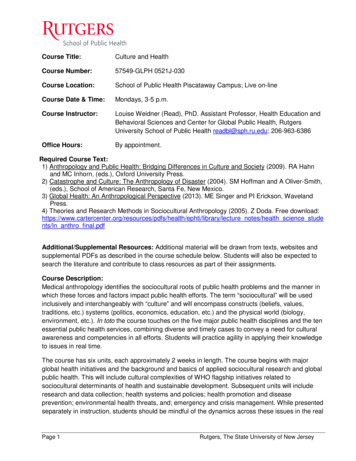
Transcription
Course Title:Culture and HealthCourse Number:57549-GLPH 0521J-030Course Location:School of Public Health Piscataway Campus; Live on-lineCourse Date & Time:Mondays, 3-5 p.m.Course Instructor:Louise Weidner (Read), PhD. Assistant Professor, Health Education andBehavioral Sciences and Center for Global Public Health, RutgersUniversity School of Public Health readbl@sph.ru.edu; 206-963-6386Office Hours:By appointment.Required Course Text:1) Anthropology and Public Health: Bridging Differences in Culture and Society (2009). RA Hahnand MC Inhorn, (eds.), Oxford University Press.2) Catastrophe and Culture: The Anthropology of Disaster (2004). SM Hoffman and A Oliver-Smith,(eds.), School of American Research, Santa Fe, New Mexico.3) Global Health: An Anthropological Perspective (2013). ME Singer and PI Erickson, WavelandPress.4) Theories and Research Methods in Sociocultural Anthropology (2005). Z Doda. Free fs/health/ephti/library/lecture notes/health science students/ln anthro final.pdfAdditional/Supplemental Resources: Additional material will be drawn from texts, websites andsupplemental PDFs as described in the course schedule below. Students will also be expected tosearch the literature and contribute to class resources as part of their assignments.Course Description:Medical anthropology identifies the sociocultural roots of public health problems and the manner inwhich these forces and factors impact public health efforts. The term “sociocultural” will be usedinclusively and interchangeably with “culture” and will encompass constructs (beliefs, values,traditions, etc.) systems (politics, economics, education, etc.) and the physical world (biology,environment, etc.). In toto the course touches on the five major public health disciplines and the tenessential public health services, combining diverse and timely cases to convey a need for culturalawareness and competencies in all efforts. Students will practice agility in applying their knowledgeto issues in real time.The course has six units, each approximately 2 weeks in length. The course begins with majorglobal health initiatives and the background and basics of applied sociocultural research and globalpublic health. This will include cultural complexities of WHO flagship initiatives related tosociocultural determinants of health and sustainable development. Subsequent units will includeresearch and data collection; health systems and policies; health promotion and diseaseprevention; environmental health threats, and; emergency and crisis management. While presentedseparately in instruction, students should be mindful of the dynamics across these issues in the realPage 1Rutgers, The State University of New Jersey
world. Risk perception as both a product and producer of sociocultural factors will be anoverarching theme. Cross-cutting issues will also include protracted versus acute or emergentproblems, and ethical and practical considerations. Students will examine public health as a sociocultural processes in its own right, and will consider the implications of their own worldview to theirengagement in their profession.Selected Concentration Competencies Addressed.This course addresses all seven competencies identified for the Rutgers University School of PublicHealth Masters in Public Health, Concentration in Global Public Health, which are to:1. Evaluate determinants of global public health in a range of context based on the five majorpublic health perspectives: systems and policies, epidemiology, biostatistics, environmentaland occupational health, and health education and behavioral science.2. Demonstrate an understanding of the economic, educational, political, sociocultural,environmental, ecological and biological conditions that represent obstacles to attaining globalhealth.3. Demonstrate an understanding of international regulations, transfer of new pharmaceuticals intohealth systems and management of global health programs.4. Analyze root causes of morbidity and mortality in major regions of the world and how they areaffected by demographic, socio-cultural, biological, occupational and environmental factors.5. Apply fundamental principles of global standards for the protection of human subjects in diversecultural settings.6. Apply the fundamental principles of global public health perspectives on global public healtheducation, research, and practice.7. Exhibit skill sets required for global health practice including written and verbal communicationskills, capacity for inter-professional teamwork, leadership, social awareness and culturalcompetency to enhance capacity strengthening and service delivery with compassion andintegrity.Course Learning Objectives:By the end of the course students will be able to: Describe five sociocultural determinants of health and provide an example of each. Describe five major sustainable development goals and described how sociocultural factorsmight impact each. Describe how risk perception can impact public health research or program initiatives, and citeat least one theory. Identify three health metrics and describe how qualitative data could improve datainterpretability of each. Describe ethical issues and potential unintended consequences of sociocultural research. . Select a health problem and describe the dynamic across sociocultural constructs, socio-culturalsystems and the physical environment.Page 2Rutgers, The State University of New Jersey
Describe an example where introduction of a product was impacted by sociocultural constructsand sociocultural systems.Describe an example where risk perception and emergency preparedness were impacted byboth sociocultural constructs and sociocultural systems.Describe an example where a health education/health promotion initiative was impacted by bothsociocultural constructs and sociocultural systems.Name five WHO health systems indicators and sociocultural factors that impact them.Describe or discuss potential implications or complications of global health competencies suchas “promoting inclusion of representatives of diverse constituencies in partnerships” and using“diplomacy and conflict resolution strategies with partners”.Describe a major theory for closing gaps between public understanding and public practicewhere health and/or safety are concerned.Provide a current example of inter-crises where one or more crisis is manmade.Describe two socio-cultural traits in disrupted or displaced cultures that present uniquechallenges to public health efforts.Describe two factors that can influence health and safety practices at the workplace.Describe two core functions of the WHO Emergency Response Framework and explain howsocio-cultural factors at the local level can impact these functions.Course Requirements and Grading:This course has 6 units, each approximately two weeks in length. Some adjustment is made aroundexams and mid-semester recess. Classroom time will not be spent covering in detail the assignedreadings and media. Students are expected to come to class already familiar with the material andready to engage in discussing, examining, questioning and adding to it.A total of 1000 points are available. Content knowledge of major themes will be assessed with twomixed-format exams. Critical thinking and analysis will be assessed with four written assignmentsand with 2 assignments that are to be both written and presented orally for discussion (10 minutes).Written assignments will be posted in Moodle three days in advance of class and will be part of theclass discussion. Satisfactory completion of assignments requires that students meet the objectivecriteria for content and writing conventions. While attendance is not graded, successfulassignments and exams will depend on attendance and interaction.Exams:Written assignments:Written and oral assignments:Page 32 @ 200 points/each: 4004 @ 75 points/each: 3002 @ 150 points/each: 3001000Rutgers, The State University of New Jersey
Course Schedule:The description of the six course units below is followed by the articulated weekly schedule.WEEKS 1-3 Class Introduction and Unit 1: Culture, Anthropology and Global Public HealthFollowing a course overview, Unit 1 will introduce key anthropological theories on how social unitsform, function and adapt and why cultural factors and forces must be accounted for in public health.The unit covers major entities and initiatives and the historical and practical convergence betweenanthropology with public health. Unit 1 addresses dynamics between sociocultural constructs(beliefs, values, traditions, etc.), sociocultural systems (politics, economics, education, etc.) and thephysical world (biology, environment, etc.). Students will examine WHO Social Determinants ofHealth and UN/WHO Sustainable Development Goals and will consider their own culture and socialgroups within the theories, premises and resources presented. The relationship between health anddevelopment will be addressed as will cross-cultural and culture-bound aspects of risk perception.WEEKS 4-5 Unit 2: Culture and Public Health ResearchPublic health requires the ability to accurately characterize a problem and its related complexities.This unit examines the relationship between culture and the effective monitoring, surveillance anddiagnosis of health problems. Unit 2 includes the WHO Health Statistics and Information Systemsand the influence of culture on how signs, symptoms and impacts of diseases are perceived,explained, defined and reported – including perceptions of etiologies and severity. Students willconsider cultural influences on recognized health metrics and the manner in which qualitative datacan improve the interpretability of quantitative data. Unit 2 includes challenges in detecting anddocumenting subtle, hidden or denied social malignancies such as violence and persecution andthe influence of culture, including media, on risk perception. Students will consider methods,challenges and ethical issues related to research including ethnographic and other qualitativeresearch, root cause analysis, development of a local theory, etc.WEEKS 6-7 Unit 3: Culture, Structures, Systems and PoliciesUnit 3 examines the influence of culture on official and unofficial structures, systems and policiesthat impact health. This includes issues related to resources distribution, including foods. This unitincludes WHO core health systems indicators and WHO Alliance for Health Policy and SystemsResearch. Students will consider the influence of culture on concepts and values related toorganization, hierarchy and power, decision-making, accountability, governance, leadership, justice,human rights, equality, etc. Implications of such factors for the introduction of new medicalproducts, devices and services will be considered. Students will examine public health services,systems and policies as sociocultural processes in their own right, will examine the need for culturalcompetence in such work, and will consider the implications of their own worldview to theirengagement in these processes.WEEK 8 Spring BreakWEEK 9 Mid-Term Exam, March 19. The exam will take place in the classroom 3-5 p.m.There will be no class session.Page 4Rutgers, The State University of New Jersey
WEEKS 10-11 Unit 4: Culture and Programs for Health Promotion and Disease PreventionIn Unit 4 students will consider the impacts of culture on health promotion and disease preventioninitiatives. This will include development initiatives, including those related to nutrition and foodsecurity. This unit will address the complexities of ensuring cultural appropriateness; stakeholderparticipation; compatibility with larger entities and initiatives at all levels; efficient use of resources,and; plans for sustainability, transfer or phase-out. Students will re-examine major theories of healthand culture and apply them to issues at hand. This unit will address the challenges of research anddata collection in needs assessment, planning, implementation, evaluation, impact assessment andfollow-up. Students will examine the complexities of prioritizing goals, objectives and methods andthe importance of ongoing formative assessment and program agility. Students will consider thechallenges of reaching individuals whose access to information is limited by language or culturalbarriers including women and children in traditional settings, and will consider the confluence ofsocio-demographics, risk perception and the effectiveness of initiatives.WEEKS 12-13 Unit 5: Culture and Hazards Natural, Built and Social Environments.Unit 5 exposes students to the breadth of issues addressed in the WHO Public Health,Environmental and Social Determinants of Health program strategies. This unit examines theinfluences of culture on defining, explaining, tolerating and controlling environmental hazards andrisks. Students will consider hazards in natural and built physical environments as well as hazardsproduced in the social environment, including violence, poverty and food insecurity. Students andwill consider the impacts of culture on risk perception and adaptation/mal-adaptation and will do sofor both acute and protracted hazards. Students will examine environmental, occupational andsocial regulation as cultural processes in their own right and will consider the role ofcompeting/conflicting interests. Students will consider models and theories for improving theperception and management of risk and will consider the impact of interacting hazards.WEEKS 14-15 Unit 6: Culture and Emergency and Crisis ManagementAgainst the backdrop of Unit 5, this unit will cover emergency and crisis management. Students willbecome familiar with the WHO Emergency Response Framework, the cultural forces that drivepolicies and the cultural forces that impact policy implementation by governing bodies andindividuals. Students will examine theories and models for closing the gaps between risk perceptionand preparedness when resources are not a barrier. Students will consider how culture cancontribute to emergencies/crises, such as techno-environmental disasters, and how emergenciesand crises can in turn impact culture in short- and long-terms. This unit addresses the complexitiesof culture and interacting crises, multi-crisis and sequential crisis conditions. The geopolitics ofemergency and crisis management will be addressed, including the control of diseases subsequentto a disaster. Students will consider the cultural aspects of emergency/crisis management amongdisplaced populations/disrupted cultures.Page 5Rutgers, The State University of New Jersey
Learning Management System: Moodle will be used extensively throughout the semester for coursesyllabus, assignments, announcements, communication and/or other course-related activities. It is thestudent’s responsibility to familiarize themselves with Moodle and check it regularly. If you have difficultiesaccessing Moodle, please inform the instructor and Moodle Support (moodlehelp@ca.rutgers.edu. Moodle isaccessible at moodle.rutgers.edu.School of Public Health Honor Code: The School of Public Health Honor Code is found in the studentbulletin (sph.rutgers.edu/academics/catalog/index.html ). Each student bears a fundamental responsibility formaintaining academic integrity and intellectual honesty in his or her graduate work. For example, all studentsare expected to observe the generally accepted principles of scholarly work, to submit their own rather thananother’s work, to refrain from falsifying data, and to refrain from receiving and/or giving aid on examinationsor other assigned work requiring independent effort. In submitting written material, the writer takes fullresponsibility for the work as a whole and implies that, except as properly noted by use of quotation marks,footnotes, etc., both the ideas and the works used are his or her own. In addition to maintaining personalacademic integrity, each student is expected to contribute to the academic integrity of the school communityby not facilitating inappropriate use of her/his own work by others and by reporting acts of academicdishonesty by others to an appropriate school authority. It should be clearly understood that plagiarism,cheating, or other forms of academic dishonesty will not be tolerated and can lead to sanctions up to andincluding separation from the Rutgers School of Public fdeStudents with Disabilities: Rutgers University welcomes students with disabilities into all of the University'seducational programs. In order to receive consideration for reasonable accommodations, a student mustApply for Services by first completing a Registration Form with the Rutgers Office of Disability Services (ODS)at ods.rutgers.edu. The student will also be required to participate in an ODS intake interview and providedocumentation. If reasonable accommodations are granted, ODS will provide you with a Letter ofAccommodations which should be shared with your instructors as early in your courses as possible.Graduate Student Computer Policy: Students are required to possess a personal laptop, no older thanapproximately two years, that must meet minimum requirements which may be found online at:sph.rutgers.edu/student life/computer requirements.htmlPolicy Concerning Use of Recording Devices and Other Electronic Communications Systems: Whenpersonally owned communication/recording devices are used by students to record lectures and/or classroomlessons, such use must be authorized by the faculty member or instructor who must give either oral or writtenpermission prior to the start of the semester and identify restrictions, if any, on the use of mobilecommunications or recording devices.Withdrawal/Refund Schedule: Students who stop attending their course(s) without processing an Add/DropCourse form will receive a failing grade. Furthermore, students dropping to zero credits for the semester areconsidered withdrawn and must submit a completed Leave of Absence form from the School of PublicHealth’s Office of Student Affairs. The School of Public Health refunds tuition only. Administrative andtechnology fees are non-refundable. You may find the Withdrawal/Refund Schedule on the School of PublicHealth website at:sph.rutgers.edu/academics/registration/school calendars.htmlPage 6Rutgers, The State University of New Jersey
COURSE SCHEDULE 2018: Culture and Health, School of Public Health, Rutgers UniversityRequired resources are:1) Anthropology and Public Health: Bridging Differences in Culture and Society (2009). RA Hahn and MCInhorn, (eds.), Oxford University Press.2) Catastrophe and Culture: The Anthropology of Disaster (2004). SM Hoffman and A Oliver-Smith, (eds.),School of American Research, Santa Fe, New Mexico.3) Global Health: An Anthropological Perspective (2013). ME Singer and PI Erickson, Waveland Press.4) Theories and Research Methods in Sociocultural Anthropology (2005). Z. Doda. Download free and in ealth/ephti/library/lecture notes/health science students/ln anthro final.pdfNOTE THAT READINGS ARE TO BE COMPLETED BEFORE EACH WEEK’S CLASS SESSION!INTRODUCTION: WEEK OF JANUARY 22 By Jan. 22, log in to Moodle to view course website and syllabus. Jan. 22, attend first class session:-introductions and background of class members;-overview of course instructional model and expectations;-the historical and practical convergence of anthropology and global public health;-introduction to Unit 1;-description of Assignment #1, due in Moodle Friday, Feb. 2 (see full description in Moodle). By Jan. 28, complete these assigned readings/media due for Unit 1 class discussion Jan. 29:Hahn and Inhorn, pages 1-16 (up to “Anthropological Methods in Public Health”).Hoffman and Oliver-Smith, pages 3-22.Singer and Erickson, pages 1-34.Doda, pages 38-58; 100-107; 165-183.Follow the link to WHO “What We Do” http://who.int/about/what-we-do/en/ and “Where WeWork” http://who.int/about/where-we-work/en/ Explore WHO Social Determinants of Health main page (first link) then download and read Healthin the Post-2015 Agenda: A Need for a Social Determinants of Health Approach (second link):o http://www.who.int/social determinants/sdh definition/en/o http://www.who.int/social determinants/advocacy/UN Platform FINAL.pdf?ua 1 Take a look at the same issue for the es/SocietalDeterminantsHealth.pdf Page 7Rutgers, The State University of New Jersey
UNIT 1: Key Concepts, Entities and Initiatives in Medical Anthropology and Global HealthWeek of Jan. 29: Unit 1-Week 1 Jan. 29 class session: discussion of key themes and concepts from readings/media listed above. By Friday, Feb. 2, post to Moodle Assignment #1. By Feb. 4, complete these assigned readings/media due for Unit 1 class discussion Feb. 5: Global Health Diplomacy. V Adams, TE Novotny, H Leslie. Medical Anthropology 27(4), pages 315323 (2008). Statement on Ethics, American Anthropological Association tatement/ The Social Amplification of Risk: A Conceptual Framework. RE Kasperson, O Renn, P Slovic, HSBrown, J Emel, JX Kasperson, S Ratick. Risk Analysis, 8(2):177-187 j.1539-6924.1988.tb01168.x/epdfWeek of Feb. 5: Unit 1-Week 2 Feb. 5 class session:-discussion of key themes and concepts from readings/media listed above;-student discussions/presentations of Assignment #1;-introduction to Unit 2-description of Assignment #2, due to Moodle Friday, Feb. 16 (see full description in Moodle). By Feb. 11, complete these assigned readings/media due for Unit 2, Week 1, class discussion Feb. 12: WHO Core Health Indicators 5/100CoreHealthIndicators 2015 infographic.pdf?ua 1 Doda, pages 59-79. Hahn and Inhorn, pages 16-31 Hahn and Inhorn, Chapters 1, 4 & 6 Measures of Health and Disease in Populations. AA Hyder, RH Morrow ad?doi 10.1.1.522.9447&rep rep1&type pdf.Page 8Rutgers, The State University of New Jersey
UNIT 2: Culture and Public Health ResearchWeek of Feb. 12: Unit 2-Week 1 Feb. 12 class session: discussion of key themes and concepts from readings/media listed above; By Feb. 16, post to Moodle Assignment #2. By Feb. 18, complete these assigned readings/media due for Unit 2, Week 2 class discussion Feb. 19: Influenza, Anthropology and Global Uncertainties. L Atlani-Duault, C Kendall, MedicalAnthropology 28(3), pages 207-211 (2009). NOTE: You must copy and paste the address below todownload (no active 63170 Influenza Anthropology and Global Uncertainties Draft Outcome Document of the United Nations Summit for the Adoption of the Post-2015Development Agenda on Sustainable Development Goals (2015) Pages 14-28 (Read up to “Meansof w doc.asp?symbol A/69/L.85&referer http://www.un.org/sustainabledevelopment/&Lang E Main pages of WHO Global Health Observatory (GHO) and Health Data Collaborative.http://www.who.int/gho/about/en/ and orative/en/Week of Feb. 19: Unit 2-Week 2 Feb. 19 class session:-discussion of key themes and concepts from readings/media due this day (listed above);-student discussions/presentations of Assignment #2;-description of Assignment #3, due to Moodle Friday, Mar. 2 (see full description in Moodle);-introduction to Unit 3. By Feb. 25, complete these assigned readings/media due for Unit 3, Week 1 class discussion Feb. 26: Hahn and Inhorn, Chapters 8, 17, 18 and 19. See UN Document on Sustainable Development Goals, Goal #3 (page 16).http://www.un.org/ga/search/view doc.asp?symbol A/69/L.85&referer http://www.un.org/sustainabledevelopment/&Lang E Use this link for WHO handbook Monitoring the Building Blocks of Health Systems. Read theIntroduction and learn the six key areas.http://www.who.int/healthinfo/systems/WHO MBHSS 2010 full web.pdfPage 9Rutgers, The State University of New Jersey
UNIT 3: Culture, Structures, Systems and PoliciesWeek of Feb. 26: Unit 3-Week 1 Feb. 26 class session: discussion of key themes and concepts from readings/media listed above. By Mar. 2, post to Moodle Assignment #3. By Mar. 4, complete these assigned readings/media due for Unit 3, Week 2 class discussion Mar.5. Hahn and Inhorn, Chapters 23&24. Global Health Competency Model ASPPH rrativeGraphicGHCompsVersion1.1FINAL-SJC.docWeek of Mar. 5: Unit 3-Week 2 Mar. 5 class session:-discussion of key themes and concepts from readings/media listed above;-student discussions/presentations of Assignment #3-preparation for mid-term on Mar. 19;-description of Assignment #4, due to Moodle Friday, March 30 (full description available in Moodle);-introduction to Unit 4. Mar. 5-25: complete these assigned readings/media due for class discussion Mar. 26:WEEK OF MARCH 12 – SPRING BREAK - NO CLASSWEEK OF MARCH 19 – MID-TERM FOR UNITS 1-3. IN THE CLASSROOM, 3-5 p.m.Page 10Rutgers, The State University of New Jersey
Page 1 Rutgers, The State University of New Jersey Course Title: Culture and Health. Course Number: 57549-GLPH 0521J-030 Course Location: School of Public Health Piscataway Campus; Live online- Course Date & Time: Mondays, 3-5 p.m. Course Instructor: Louise Weidner (Read), PhD. Assistant Professor, Health Education and
